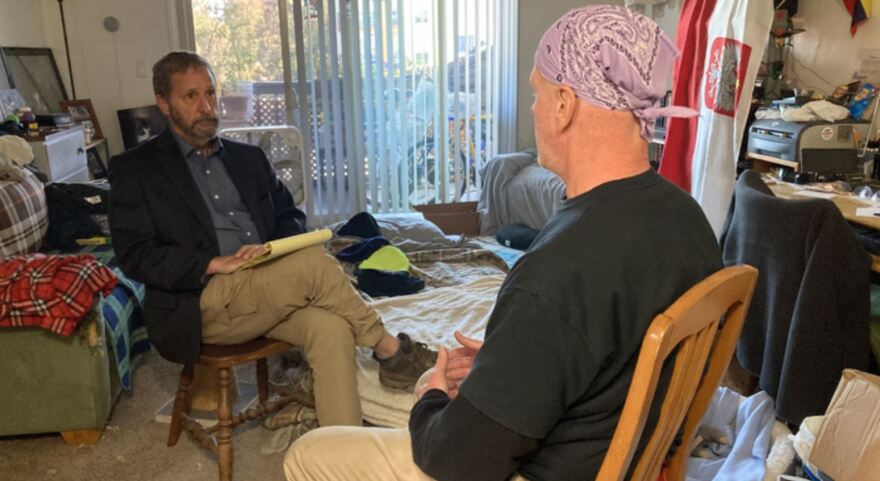Michael had been smoking cannabis for at least 20 years when, one day, he started feeling heartburn. Soon he had a bowel movement, and the severe nausea began.
“After that I had these vomiting cycles about every four hours where I would have this brutal nausea,” said Michael, an Ocean Beach resident who didn’t want his last name used.
“This went on, on a Sunday. I went to urgent care that night. They couldn’t help me," Michael said. "The next morning I wound up in the emergency room getting an IV for dehydration.”
The condition Michael suffered is called cannabinoid hyperemesis syndrome, a severe and recurring nausea that can happen among people who have used cannabis for a long time.
Other adverse side effects include a rapid heart rate, paranoia and cannabis-induced psychosis.
Justin Morrison comes from a family with a history of mental illness. He remembers getting high after seeing a movie.
“I had to remain in the parking lot with my friend until about three o’clock in the morning,” Morrison said. “Because during that time I became catatonic, I wasn’t able to speak, I had intense visualizations of regression backward in time, back into the womb!”
He said his brother had it much worse, ending up in the hospital several times after using pot, in one case for six months.
“It has a particular effect on his attention. And he tends to get hyper-focused on metaphysical elements so he’ll have a conversation with someone and start to believe that this person has mystical powers, that he is perhaps a saint or Jesus Christ himself,” Morrison said.
A study out of UC San Diego showed that after medical cannabis was legalized in California, many elderly people were ending up in the hospital. The study found a 1,804% increase in cannabis-related emergency room visits among people older than 65 from 2005 to 2019.
Dr. Benjamin Han, a geriatrician and UC San Diego professor, authored the study, which did not show what conditions led to the hospital visits. But he said his work with older folks, who used cannabis for medical reasons, have been revealing. He said one spoke of a time he swallowed quite a few cannabis-laced gummies.
“And then two hours later (his) heart is racing, it’s like, 'I’m so anxious. I don’t know what’s going on.' And then they end up in the emergency department,“ Han said.
Medical doctors like Han stress that cannabis is not a drug all people need to avoid. Keep in mind, he said, alcohol-related ER visits happen at 10-times the rate of cannabis. But there are some groups of people that are at greater risk of cannabis side effects.
Igor Grant, the director of UCSD’s Center for Medicinal Cannabis Research, said many old folks, for instance, are unfamiliar with cannabis. And when you use cannabis orally, you don’t feel the effect right away.

“They think, 'well, maybe I haven’t taken enough.' So they take more. But what is happening is there’s this delayed process of absorption. And then when they take a lot more they get hammered!” Grant said.
We’ve seen already that there are people who are vulnerable to cannabis due to mental illness or to the fact that they’re used a lot of it over a long time. Grant says the vomiting and nausea Micheal suffered is common but a bit ironic, because cannabis is actually used to prevent nausea in cancer patients.
But longtime cannabis users might be desensitized to the anti-nausea effects.
“Some people who have used a lot of marijuana for a long time, end up changing some of the circuits in the brain that control nausea and vomiting,” Grant added. “So those circuits get desensitized, if you will, and more prone to actually having the opposite effect.”
Justin Morrison said his brother, who suffered psychosis after cannabis use, is doing better. He’s not off drugs entirely but he knows to avoid cannabis.
Michael still uses cannabis to treat his PTSD. But after suffering severe nausea he learned that he was just taking too much and given the strong THC content in today’s pot, you need to moderate your use of it.
“People need to be educated about their marijuana use. And they need to be warned,” he said, adding that these days medicinal users need to figure out, on their own, the cannabis doses they should be taking.
The study of cannabis has been held back because it remains a schedule one narcotic under federal law.









